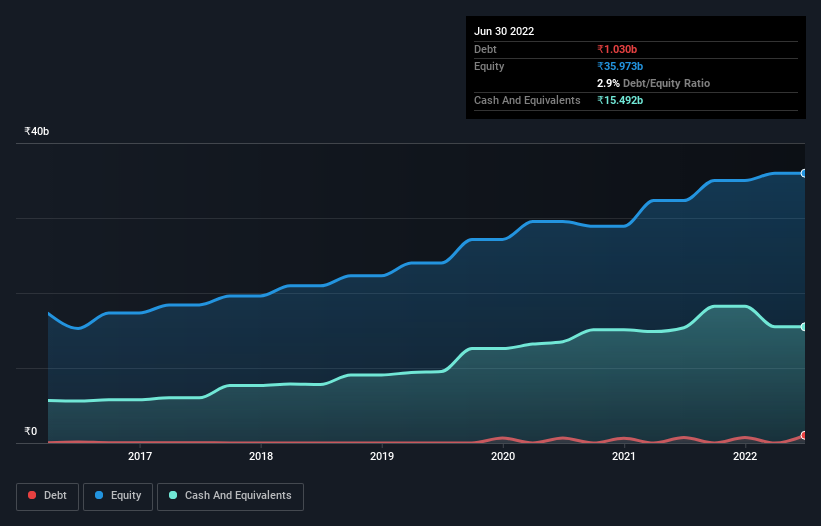Legendary fund manager Li Lu (who Charlie Munger backed) once said, 'The biggest investment risk is not the volatility of prices, but whether you will suffer a permanent loss of capital.' So it seems the smart money knows that debt - which is usually involved in bankruptcies - is a very important factor, when you assess how risky a company is. We note that Mahanagar Gas Limited (NSE:MGL) does have debt on its balance sheet. But should shareholders be worried about its use of debt?
When Is Debt Dangerous?
Debt and other liabilities become risky for a business when it cannot easily fulfill those obligations, either with free cash flow or by raising capital at an attractive price. In the worst case scenario, a company can go bankrupt if it cannot pay its creditors. However, a more frequent (but still costly) occurrence is where a company must issue shares at bargain-basement prices, permanently diluting shareholders, just to shore up its balance sheet. Of course, the upside of debt is that it often represents cheap capital, especially when it replaces dilution in a company with the ability to reinvest at high rates of return. The first step when considering a company's debt levels is to consider its cash and debt together.
View our latest analysis for Mahanagar Gas
What Is Mahanagar Gas's Net Debt?
You can click the graphic below for the historical numbers, but it shows that as of March 2022 Mahanagar Gas had ₹1.03b of debt, an increase on ₹741.0m, over one year. But on the other hand it also has ₹15.5b in cash, leading to a ₹14.5b net cash position.

How Healthy Is Mahanagar Gas' Balance Sheet?
Zooming in on the latest balance sheet data, we can see that Mahanagar Gas had liabilities of ₹13.3b due within 12 months and liabilities of ₹3.10b due beyond that. Offsetting this, it had ₹15.5b in cash and ₹2.49b in receivables that were due within 12 months. So it can boast ₹1.62b more liquid assets than total liabilities.
This surplus suggests that Mahanagar Gas has a conservative balance sheet, and could probably eliminate its debt without much difficulty. Simply put, the fact that Mahanagar Gas has more cash than debt is arguably a good indication that it can manage its debt safely.
In fact Mahanagar Gas's saving grace is its low debt levels, because its EBIT has tanked 28% in the last twelve months. Falling earnings (if the trend continues) could eventually make even modest debt quite risky. There's no doubt that we learn most about debt from the balance sheet. But it is Mahanagar Gas's earnings that will influence how the balance sheet holds up in the future. So if you're keen to discover more about its earnings, it might be worth checking out this graph of its long term earnings trend.
But our final consideration is also important, because a company cannot pay debt with paper profits; it needs cold hard cash. Mahanagar Gas may have net cash on the balance sheet, but it is still interesting to look at how well the business converts its earnings before interest and tax (EBIT) to free cash flow, because that will influence both its need for, and its capacity to manage debt. Over the most recent three years, Mahanagar Gas recorded free cash flow worth 54% of its EBIT, which is around normal, given free cash flow excludes interest and tax. This cold hard cash means it can reduce its debt when it wants to.
Summing Up
While we empathize with investors who find debt concerning, you should keep in mind that Mahanagar Gas has net cash of ₹14.5b, as well as more liquid assets than liabilities. So we are not troubled with Mahanagar Gas's debt use. When analysing debt levels, the balance sheet is the obvious place to start. But ultimately, every company can contain risks that exist outside of the balance sheet. Case in point: We've spotted 2 warning signs for Mahanagar Gas you should be aware of.
Of course, if you're the type of investor who prefers buying stocks without the burden of debt, then don't hesitate to discover our exclusive list of net cash growth stocks, today.
New: Manage All Your Stock Portfolios in One Place
We've created the ultimate portfolio companion for stock investors, and it's free.
• Connect an unlimited number of Portfolios and see your total in one currency
• Be alerted to new Warning Signs or Risks via email or mobile
• Track the Fair Value of your stocks
Have feedback on this article? Concerned about the content? Get in touch with us directly. Alternatively, email editorial-team (at) simplywallst.com.
This article by Simply Wall St is general in nature. We provide commentary based on historical data and analyst forecasts only using an unbiased methodology and our articles are not intended to be financial advice. It does not constitute a recommendation to buy or sell any stock, and does not take account of your objectives, or your financial situation. We aim to bring you long-term focused analysis driven by fundamental data. Note that our analysis may not factor in the latest price-sensitive company announcements or qualitative material. Simply Wall St has no position in any stocks mentioned.
About NSEI:MGL
Excellent balance sheet and good value.
Similar Companies
Market Insights
Community Narratives



